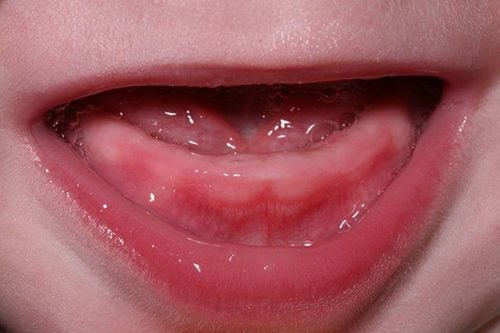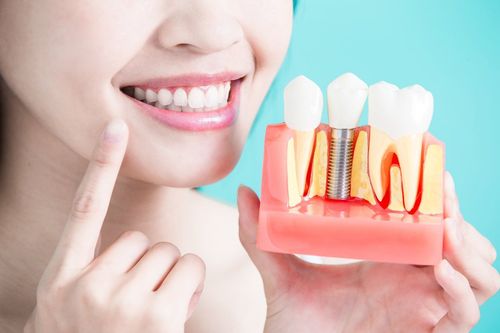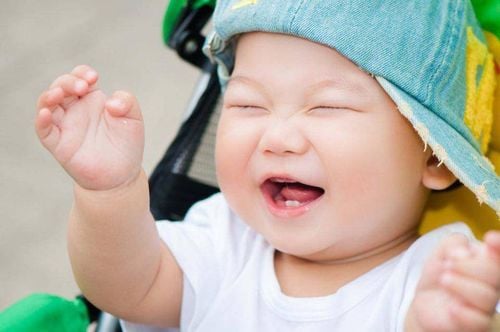This is an automatically translated article.
Baby teeth are the first set of teeth that come in after a baby is born. These are temporary teeth, meaning they will eventually fall out and be replaced by permanent teeth. However, that does not mean that it is not important, if the child does not have teeth or the baby teeth take a long time to grow, this can affect the overall development of the child.1. When is it normal to have baby teeth?
Baby teeth are also known as deciduous teeth, the first set of teeth of each person before it is replaced by permanent teeth later. Usually, baby teeth begin to erupt when a child is between 6 and 12 months old.
But every child is different. Some babies are born with teeth, some can get their first tooth as early as 4 months old, while others can reach 12 months.
If your baby doesn't have baby teeth by 12 months, take him to the dentist. You should also take your child to the dentist if the remaining teeth have not come in by the time the child is 4 years old.
In general, baby teeth begin to erupt between 6 and 12 months. At the latest, children will have their first tooth on their first birthday.
The expected eruption time of teeth varies, depending on the individual tooth. According to the American Dental Association, the typical timelines for maxillary primary teeth to erupt are:
Central incisors: 8 to 12 months; Lateral incisors: 9 to 13 months; Canines: 16 to 22 months; First molars: 13 to 19 months; Second molars: 25 to 33 months. Meanwhile, the timelines for mandibular teeth include:
Central incisors: 6 to 10 months; Lateral incisors: 10 to 16 months; Canines: 17 to 23 months; First molars: 14 to 18 months; Second molars: 23-31 months. All baby teeth will usually erupt by the time a child is 27 months to 3 years old. Remember, these timelines are general and each child's development is different so teething may occur at different times.
The eruption of baby teeth can also be 6 to 12 months behind their expected eruption time. That said, if your baby's remaining baby teeth are coming in by the time they're almost 45 months old (about 4 years old), it may not be a problem.

Răng lâu mọc ở trẻ có thể tùy vào cơ địa của mỗi trẻ
2. When to worry about baby teeth not coming in?
Delayed teething occurs when a tooth erupts later than usual. For the first baby teeth, the process of erupting between 12 and 24 months can be considered unusual. For the remaining baby teeth, the eruption after 4 years may not be normal.
The pediatric dentist can determine if the teething timeline is appropriate for the child's development.
3. What can make teeth grow longer?
Several factors can make teeth grow longer than usual or it may be the first or only symptom of an underlying medical condition.
Causes of delayed baby teeth include:
Premature or low birth weight babies: Premature birth is when a baby is born too early. Babies born prematurely are at risk for delayed growth and development, including delayed teething. Malnutrition: Proper nutrition during pregnancy and childhood is essential for proper development. Malnutrition during these times can lead to delayed teething. Several syndromes can cause delayed teething, including: Down syndrome, Apert syndrome, Ellis-van Creveld syndrome, Hutchinson-Gilford progeria syndrome, Zimmermann-Laband-1 syndrome, Axenfeld-Rieger syndrome . These conditions can also delay the eruption of permanent teeth. Developmental Disorders: Baby teeth that do not erupt or take a long time to erupt can be caused by a developmental disorder, such as intracranial dystrophy, ectodermal dysplasia, Odontodysplasia. Endocrine disorders: The endocrine system is responsible for the production of hormones. Some of these hormones regulate growth and development. Some endocrine diseases can lead to delayed teething. This may include: Hypothyroidism, hypopituitarism, hypoparathyroidism. Heredity: If your family has a history of delayed teething, your child may also have the condition. Similarly, if any of the above conditions run in your family, it could be related to late teething.
4. Is there any problem with long-growing baby teeth?
In most children, a simple delay in teething may not be a problem. However, if a baby's baby teeth erupt later than average, it can cause complications in the future.
Late teething can lead to:
Difficulty chewing; Hard to say; Difficulty making facial expressions, such as frowning or smiling.

Răng sữa không mọc có thể khiến trẻ gặp khó khăn trong vấn đề nhai và nói
5. The child is not teething, when should you go to the dentist?
If your baby hasn't had baby teeth before 12 months, take him to the dentist. You should also take your child to the dentist if his or her remaining baby teeth don't erupt by age 4. Your dentist may refer you to a specialist to determine the cause.
Other signs of needing to see a dentist include:
Loss of teeth ; Wide spacing between teeth; Unusually large or small teeth; Signs of caries in baby teeth; Baby teeth do not fall out during the eruption of permanent teeth. If the child has a fever, the temperature is above 38°C, you should take the child to the pediatrician. A slightly elevated temperature is common when babies are teething, but a fever is often a sign of something more serious. When your baby's first baby tooth comes in, take him to the dentist for a checkup.
Baby teeth usually start to erupt between 6 and 12 months. By the age of 3, many children will have full milk teeth in their mouths. However, the timing of teething for each child can be very different. A slight delay is usually not a cause for concern.
If your baby doesn't have baby teeth before 12 months, take him to the dentist. Your baby should also see the dentist if the remaining baby teeth have not come in after 4 years. The dentist can determine if this is a problem or if your baby should see another specialist.
Please dial HOTLINE for more information or register for an appointment HERE. Download MyVinmec app to make appointments faster and to manage your bookings easily.
Reference sources: colgate.com, healthline.com












